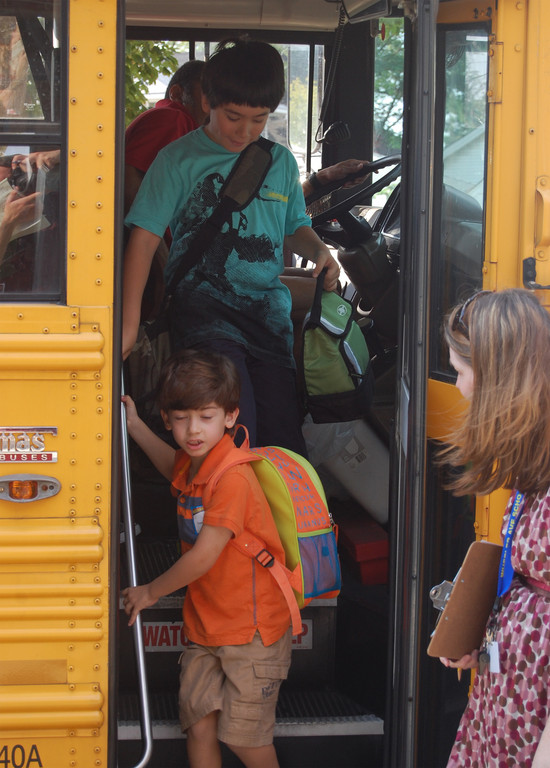Expanded busing on May ballot in District 13
District 13 voters will decide in May on a proposition to expand bus service for all children living at least a half-mile from school. A petition was submitted to the district last month and by law must be placed on the ballot.
The proposition, if passed, would cost about $296,000. Meredith Brosnan, the assistant superintendent for business, said the district would have to add four buses, and about 370 more children would become eligible for transportation to and from school.
The district currently provides transportation to children in kindergarten through third grade living at least a half-mile from school, and children in grades 4 through 6 living a mile or more away. Because District 13’s transportation policy was initially approved by voter referendum decades ago, any changes must also be approved by voters. Propositions to expand transportation to all students living a half-mile or more away were defeated in 2008 and 2009.
Wheeler Avenue School parent Galina Lampert, who organized the petition for this year’s proposition, said there are numerous reasons why transportation should be expanded. Many parents, she explained, can’t afford to buy a second car, or start work before their children start school. Hazardous weather conditions in the winter make it dangerous to walk, she said.
“We have to change the distance rule,” Lampert said. “My goal is to make more people understand the situation.”
She also cited safety concerns when children have to walk home alone. Lampert added that although propositions have failed in previous attempts, that did not dissuade her from getting it on the ballot again this year.
The bus proposition could potentially impact the district’s ability to pass the budget. This is the first year that the new tax cap is in effect, limiting how high the district can raise the tax levy. Although the percentage varies from district to district based on certain costs, the maximum tax levy increase will be about 2 percent. District officials say they are planning to develop a budget that falls within the limit, but the bus proposition could push it over.
A district must get approval from a supermajority, or 60 percent or more, of voters for a budget that exceeds the tax levy limit. Brosnan said it is not known whether the budget would need a supermajority to pass if the bus proposition pushes it over the limit. So far, the district has gotten two differing opinions from attorneys, she said, and is waiting to hear from the State Education Department. “They have to interpret the wording of the legislation,” she said, “and what the intent is.”
There is also the possibility, Brosnan said, that only the bus proposition could require 60 percent approval if that is the reason the tax cap is exceeded. Either way, these questions remain unanswered.
Board of Education President Frank Chiachiere said that the board has no choice but to put the proposition on the ballot. A total of 120 signatures were collected, more than the required 5 percent of the total number of residents who voted on the last school budget.
Lampert said that the parents who signed the petition are willing to pay the extra taxes for the bus service, estimated at about $30 per household per year.
The board has no collective opinion on the proposition. “We can’t take an official position,” Chiachiere said. “All we can do is put it on the ballot and let the public decide.”
He added that he also has questions about the impact the measure might have on the budget’s prospects amid the new tax cap restrictions. If the bus proposition does pass, he said, there won’t be anywhere near $300,000 of savings elsewhere in the budget that could make up the cost — at least not without cutting programs — so it would likely have to be added to the tax levy.
Right now, Chiachiere said, the district will go about planning its budget for next year as it awaits word from the Education Department. “It’s uncharted territory,” he said, “so we don’t know what the implications of this are going to be if it passes. But, of course, we’re going to do the will of the people.”






